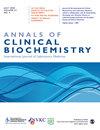UKMedLab2023会议-庆祝ACB成立70周年。
IF 2.1
4区 医学
Q3 MEDICAL LABORATORY TECHNOLOGY
Annals of Clinical Biochemistry
Pub Date : 2023-09-01
Epub Date: 2023-08-29
DOI:10.1177/00045632231193581
引用次数: 0
摘要
本文章由计算机程序翻译,如有差异,请以英文原文为准。
UKMedLab2023 conference - A celebration of 70 years of the ACB.
UKMedLab23, hosted by the Association for Clinical Biochemistry and Laboratory Medicine (ACB), was held at the Royal Armouries, Leeds, between the 10th and 12th June 2023. This year the conference celebrated 70 years of the ACB. With this in mind, and to celebrate the work and contribution of all members, each region was invited to host a parallel session at the National Meeting. All nine ACB regions accepted the invitation with enthusiasm and vigour and planned sessions showcasing the varied specialisms across the UK and Republic of Ireland. There was also a parallel session focused on the current challenges in POCT, on the top of the highly popular interactive case sessions, the Medal Award presentations and the Impact, Foundation and International plenary lectures, a special 70th anniversary President’s address and a number of industry-sponsored workshops. The sun shone and the conversation flowed, with 341 delegates, there was a real buzz about the conference venue as colleagues caught up with peers and discussed the latest advances in the field. Following the success of last year, an ACBMicrobiology training day was again held alongside the Biochemistry training day. The morning was a shared programme on management topics and scenarios and in the afternoon split discipline-specific sessions were held. The training day attracted 34 microbiology delegates and 119 biochemistry delegates, which was an increase for both cohorts from the previous year. It was wonderful to see so many colleagues in training coming together and building their networks. The meeting was opened by Bernie Croal, before the programme commenced with the International Lecture. This was presented byMaria Fitzgibbon on lessons in Chemistry, with a focus on the use and evidence for biomarkers of inflammation in cardiovascular and other diseases. This was a great example of how research can be fostered and flourished in a supportive environment with a group of collaborating scientists. A number of high-quality submissions were received for the Impact Award, and this year’s worthy winner was Tim MacDonald for the work that he and his team completed on the development of a national home finger-prick blood laboratory testing service for clinicians of Paediatric Highly Specialist Services for Complex Conditions. This inspiring talk gave the audience an idea of what is possible when teams work together to improve patient outcome and the future possibilities of home blood sampling. Following a successful change to the nomination process for the Foundation Award, more nominations were received than ever before, and it was a really difficult decision for the judging panel. This year’s winner was Paul Collinson, who gave a detailed insight into the evolution of cardiac biomarkers from the first ECGs and the use of WBC, ESR and CRP to the measurement of troponin T and I today and the potential uses for the future. He also gave an interesting reminder about the small changes that it is now possible to detect; equal to detecting a sugar cube being dropped into Loch Ness! Bernie Croal, outgoing President, and Kath Hayden, incoming President, gave a President’s address to celebrate
求助全文
通过发布文献求助,成功后即可免费获取论文全文。
去求助
来源期刊

Annals of Clinical Biochemistry
Biochemistry, Genetics and Molecular Biology-Clinical Biochemistry
CiteScore
5.20
自引率
4.50%
发文量
61
期刊介绍:
Annals of Clinical Biochemistry is the fully peer reviewed international journal of the Association for Clinical Biochemistry and Laboratory Medicine.
Annals of Clinical Biochemistry accepts papers that contribute to knowledge in all fields of laboratory medicine, especially those pertaining to the understanding, diagnosis and treatment of human disease. It publishes papers on clinical biochemistry, clinical audit, metabolic medicine, immunology, genetics, biotechnology, haematology, microbiology, computing and management where they have both biochemical and clinical relevance. Papers describing evaluation or implementation of commercial reagent kits or the performance of new analysers require substantial original information. Unless of exceptional interest and novelty, studies dealing with the redox status in various diseases are not generally considered within the journal''s scope. Studies documenting the association of single nucleotide polymorphisms (SNPs) with particular phenotypes will not normally be considered, given the greater strength of genome wide association studies (GWAS). Research undertaken in non-human animals will not be considered for publication in the Annals.
Annals of Clinical Biochemistry is also the official journal of NVKC (de Nederlandse Vereniging voor Klinische Chemie) and JSCC (Japan Society of Clinical Chemistry).
 求助内容:
求助内容: 应助结果提醒方式:
应助结果提醒方式:


